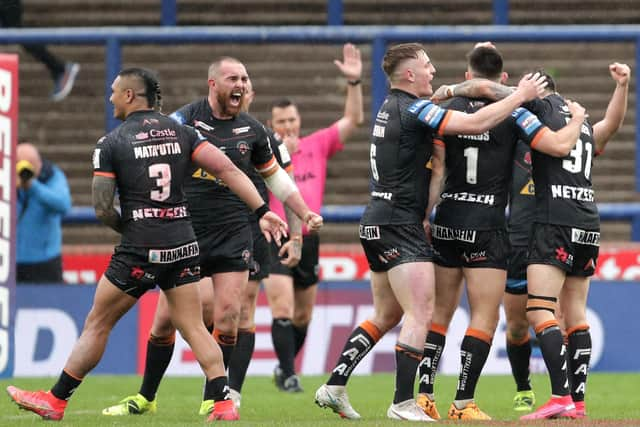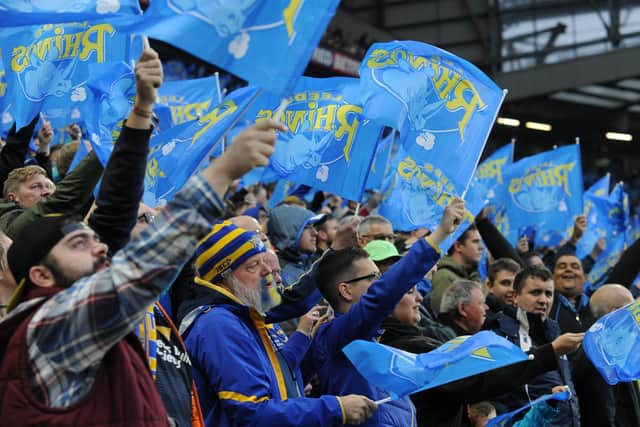Behind-closed-doors fixtures have opened a unique window into the force behind player collisions – Peter Smith


It is a hard sport, at any level, and takes a rare type of individual to play it. As much as the brutal nature of the game itself, that’s down to the culture the game is steeped in.
It’s a tough person’s code, possibly a legacy of its working-class roots. There’s a lot of truth to the cliche about rugby league being a sport where the players spend 80 minutes pretending not to be hurt.
Advertisement
Hide AdAdvertisement
Hide AdThe most famous recent example was Joe Westerman, then of Hull and now at Wakefield Trinity knocking back in a dislocated kneecap to play on in the final stages of an East Yorkshire derby.


Sometimes, bravery goes beyond common sense and players undoubtedly pay for the wear and tear on knees and other joints later in life, with some suffering even more damaging consequences.
A game of Super League has been likened to being involved in a series of low-speed car crashes and that point has been hammered home to anyone fortunate enough to have been allowed into stadiums over the past 10 months.
Television companies have disguised the lack of atmosphere by using canned crowd noise but, watching live at the ground, there is none of that.
Advertisement
Hide AdAdvertisement
Hide AdMembers of the media attending games have, therefore, been given a unique insight into the sport.


It may not be possible to make out every word, but it has become clear who gees their team up when things are going badly, which players get under the opposition’s skin and where the organisation comes from. But the most lasting impression has been the scale of the collisions which, in normal circumstances, is masked by crowd noise.
With fewer than 100 people in a stadium, every big hit is audible.
It is possible to, literally, hear the air being smashed out of a player’s lungs during a tackle.
Advertisement
Hide AdAdvertisement
Hide AdHow any of them manage to get out of bed the day after a game, never mind live a normal life, is a mystery.
For this writer, that will be the legacy of behind-closed-doors matches.
Whatever anyone is paid to play rugby league, they deserve every penny.
The commitment shown by the part-timers, at clubs like Featherstone, Batley, Dewsbury and Hunslet, who do a full day’s work before going training or playing, is particularly admirable. That said, it will be a relief for everybody involved when the turnstiles finally reopen in six days’ time.
Advertisement
Hide AdAdvertisement
Hide AdAnother lesson from the pandemic is the sport is diminished without its fans.
Players have done an incredible job managing to maintain their standards in alien conditions, but the intensity will go up a level once crowds return.
Other than Rhinos’ derby at home to Wakefield Trinity, which will be played on Friday evening, the next round of Super League matches has been put back to Monday, the day the ban on fans in stadiums is lifted.
Numbers will be limited, but even a crowd of 3,600 – the capacity for Castleford Tigers’ home game against Hull KR – will make a big difference to the spectacle.
Advertisement
Hide AdAdvertisement
Hide AdFans need to play their part by behaving responsibly, but next Monday will be the day rugby league really returns to life.
Against the odds, with only one casualty, clubs have so far managed to survive the most testing 14 months in the sport’s often troubled history.
They are far from out of the woods, but finally being able to generate some income will provide a precious lifeline.
Credit must go to every supporter and sponsor who has declined a season-ticket refund or continued their financial backing, with little or no immediate benefit.
One of two things could happen now.
Advertisement
Hide AdAdvertisement
Hide AdSupporters may be so desperate for a return to live action they flock back, or alternatively, the habit of a lifetime could be broken.
Rugby league’s biggest issue is its lack of money.
Should the latter occur, the game will remain in serious trouble but, if the pandemic has proved anything, it is that the players deserve the fans’ support.
Support the YEP and become a subscriber today. Enjoy unlimited access to local news and the latest on Leeds United, With a digital subscription, you see fewer ads, enjoy faster load times, and get access to exclusive newsletters and content. Click HERE to subscribe.
Comment Guidelines
National World encourages reader discussion on our stories. User feedback, insights and back-and-forth exchanges add a rich layer of context to reporting. Please review our Community Guidelines before commenting.